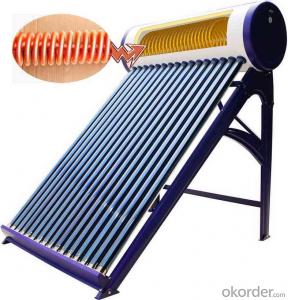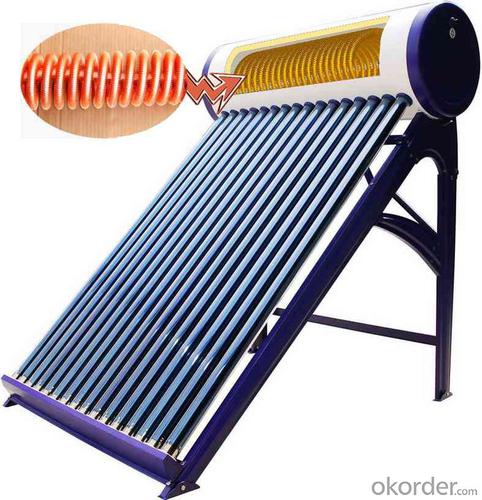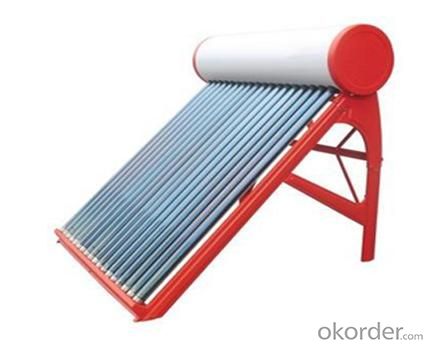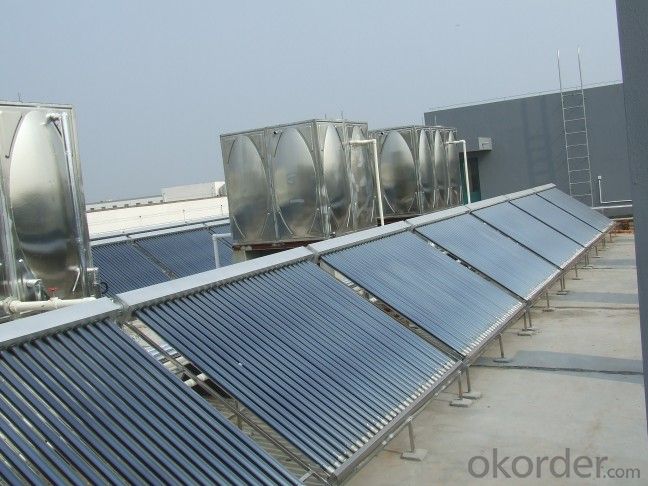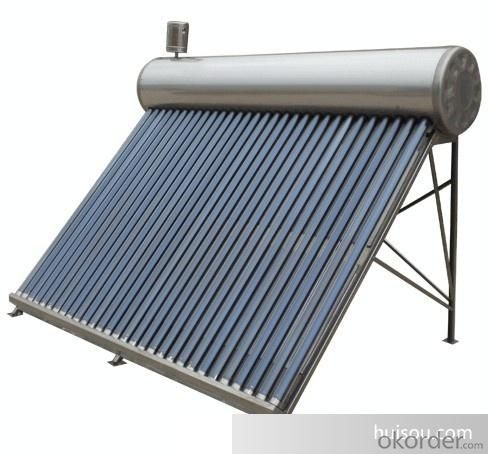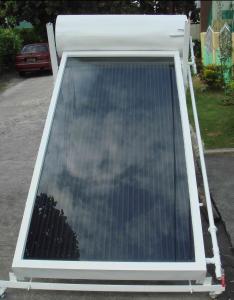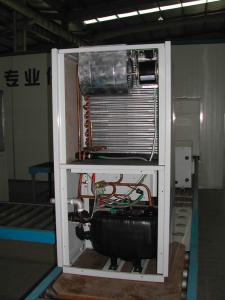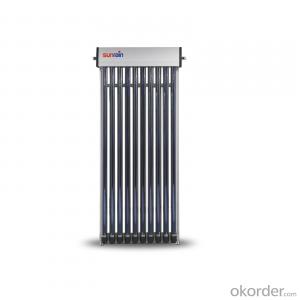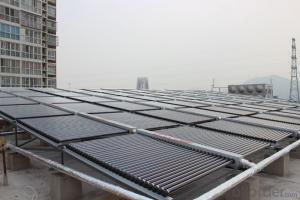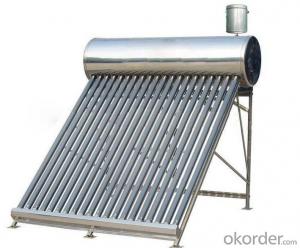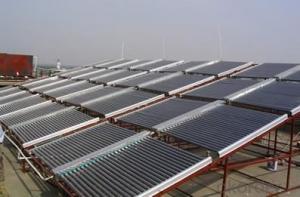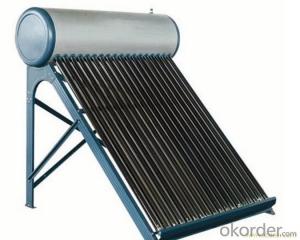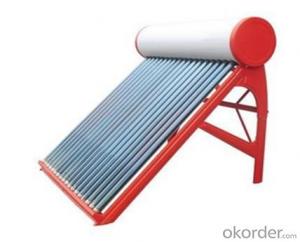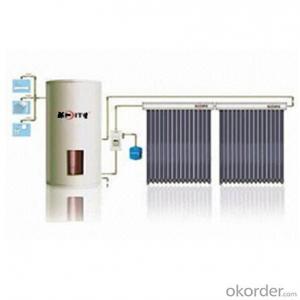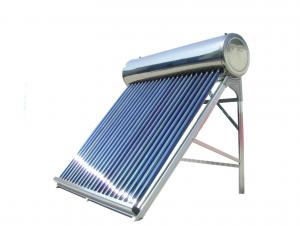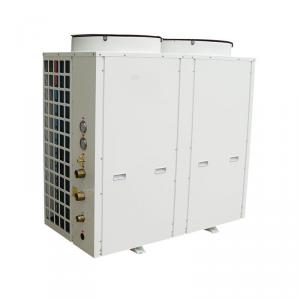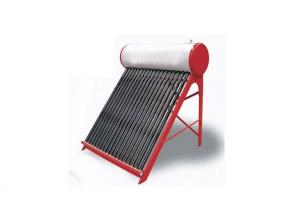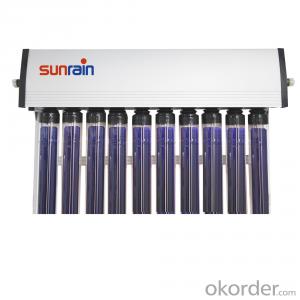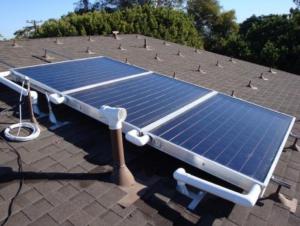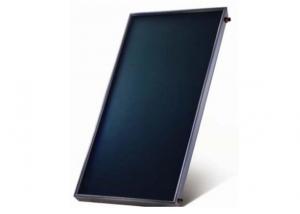Solar Water Heater India with Copper Coil in Water Tank
- Loading Port:
- China main port
- Payment Terms:
- TT OR LC
- Min Order Qty:
- 1 set
- Supply Capability:
- 6000 set/month
OKorder Service Pledge
OKorder Financial Service
You Might Also Like
Introduction of Non-Pressure Solar Water Heater:
Non-pressure Solar Heater is one of the most economical solar water heating device with pretty high efficiency at the same time. It consists of hot water storage tank, solar vacuum tubes with mouth plug in storage tank, and bracket supporting tank and tubes.When cold water in evacuated tubes is heated with solar irradiation, as the specific gravities of hot water and cold water are different, hotter water goes upward to storage tank and colder water goes downward to glass tubes. through this continuous circulation, the cold water in storage tank will be gradually heated till sunset.
Specialty:
1. High thermal performance and working temperature: the heat exchanging rate even in winter can up above 55%.
2. Heat collecting efficiency is at least 20% above common solar systems.
3. Work in all day and all season: no matter any corner of the world, this system can work well even -40℃ to avoid the tube freezing problem.
4. Reliability: No water following through the tube, so water scale can not generate and tube cracks could be avoided, the system still can keep working even with some damaged tubes.
5. It can connect with water tap and work automatically with pressure0.6Mpa, bring enjoyable washing experience.
6. Safety: P/T valve would release pressure and temperature to protect tank..
Technical Specification:
1. Outer tank material: SUS304 stainless steel or powder coated color steel
2. Inner tank material: 1.2mm thick SUS304 food grade stainless steel ( Optional material SUS316L)
3. Vacuum tube material: borosilicate glass 3.3; AL-SS-CU absorb coating, with copper heat pipe inside
4. Frame material: 1.2mm thickness stainless steel
5. Insulation material: 55mm thickness polyurethane
6. Suitable for mains pressure water(up to 8 bar/116psi)
7. Easy plug-in installation
8. Install the T/P valve on the pressurized tank
9. Seal material: Stabilized High Temperature Silicon
Outer tank material: SUS304 stainless steel or powder coated color steel
Inner tank material: 1.2mm thick SUS304 food grade stainless steel ( Optional material SUS316L)
Vacuum tube material: borosilicate glass 3.3; AL-SS-CU absorb coating, with copper heat pipe inside
Frame material: 1.2mm thickness stainless steel
Insulation material: 55mm thickness polyurethane
Suitable for mains pressure water(up to 8 bar/116psi)
Easy plug-in installation
Install the T/P valve on the pressurized tank
Seal material: Stabilized High Temperature Silicon
19. Vacuum Tube | 20. Size (mm) | 21. Φ47*1500 / Φ58*1800 / Φ70*2100 | |||||
22. Tube (pcs) | 23. 10 / 12 / 15 / 18 / 20 / 22 / 24 / 30 / 36 / 42 | ||||||
24. Material | 25. Borosilicate 3.3 glass, magnetron spluttering selective coating | ||||||
26. Coating | 27. Single-target AL-N/AL or Three-target AL/N-Cu-SS | ||||||
28. Water Tank | 29. Capacity | 30. 80L ~ 500L for hot water storage tank | |||||
31. Inner tank | 32. Food-grade stainless steel SUS304-2B / SUS316 | ||||||
33. Insulation | 34. High-density polyurethane foam with 70~80 hour heat preservation | ||||||
35. Tank shell | 36. Food-grade stainless steel SUS304-2B | ||||||
37. Bracket | 38. Shaped strong aluminum alloy structure adaptable for flat or slope roof | ||||||
39. Accessories | 40. Anti-aging silicon seals, Dustproof seals, Air-vent cap, Stainless screws | ||||||
41. Auxiliary Devices | 42. Assistant tank, Intelligent controller, Electrical heater, Magnesium anodes | ||||||
43. Tilt Angle | 44. 25 ~ 50° | ||||||
45. Water Output | 46. 45 - 95°C | ||||||
47. Hail Resistance | 48. Φ25mm diameter | ||||||
49. Model Number | 50. Solar Vacuum Tube | 51. Tank 52. Liter | 53. System 54. Liter | 55. Container Loading Qty /sets | |||
56. Size /mm | 57. Qty /pcs | 58. 20GP | 59. 40GP | 60. 40HQ | |||
61. VNS-58SA12-100 | 62. Φ58*1800 | 63. 12 | 64. 100 | 65. 132 | 66. 58 | 67. 119 | 68. 140 |
69. VNS-58SA15-130 | 70. 15 | 71. 130 | 72. 170 | 73. 54 | 74. 108 | 75. 131 | |
76. VNS-58SA18-150 | 77. 18 | 78. 150 | 79. 198 | 80. 43 | 81. 86 | 82. 105 | |
83. VNS-58SA20-170 | 84. 20 | 85. 170 | 86. 223 | 87. 40 | 88. 80 | 89. 97 | |
VNS-58SA24-200 | 24 | 200 | 263 | 35 | 70 | 85 | |
VNS-58SA30-250 | 30 | 250 | 329 | 28 | 56 | 68 | |
VNS-58SA36-300 | 36 | 300 | 395 | 23 | 47 | 57 | |
Products Show
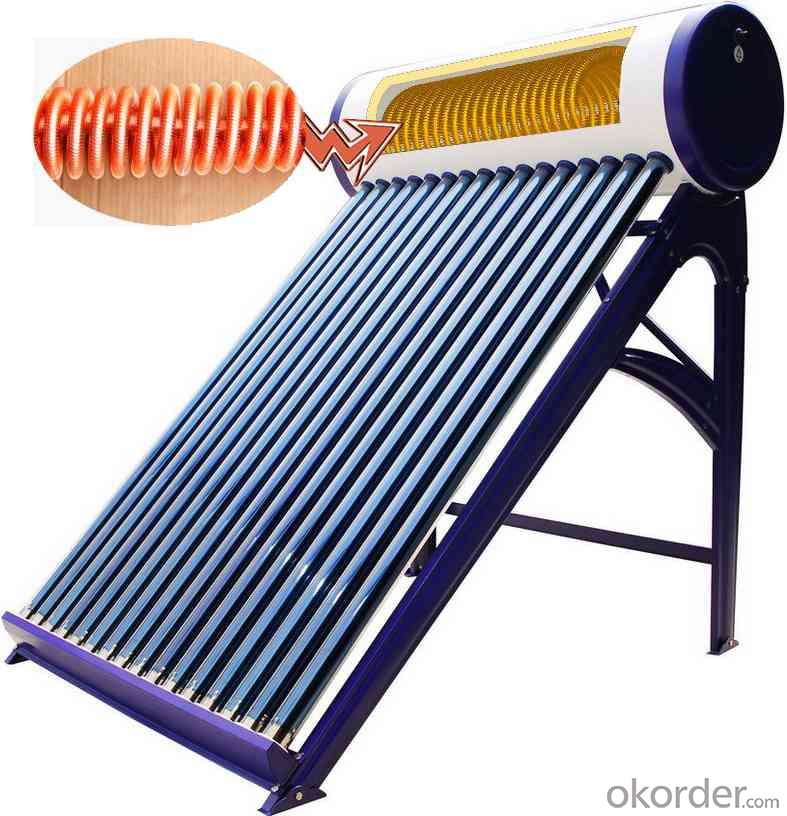
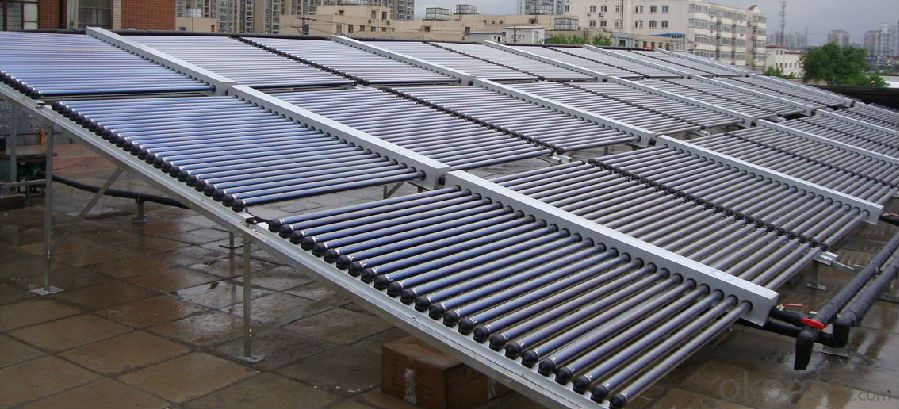
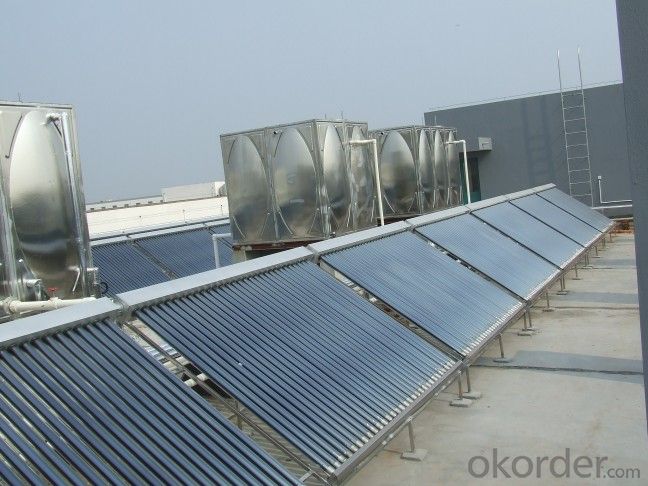
Our Services
1. OEM service
2. Warranty: 5 years
3. Considerable after sale service
Color steel Compact pressure Thermal solar heater
FAQ:
1. What’s the delivery time?
10 days after receiving deposit.
2. How long is the warranty?
5 years for whole system, 1 year for accessory
3. What’s your production capacity?
6000sets/month
4. What’s the MOQ?
1 set.
5. What’s your payment term?
Container: 30% T/T in advance for deposit, 70% T/T before shipment for fist order.
70% T/T after seeing copy of B/L from second order
Sample: 100% T/T in advance
Other choices: L/C at sight.
6. What certifications do you have?
CE, SOLAR KEYMARK, SRCC and etc.
- Q: How does a solar water heater affect home resale value?
- A solar water heater can positively impact home resale value by increasing its overall energy efficiency and reducing utility costs for potential buyers. Additionally, it can attract environmentally conscious buyers who appreciate sustainable features in a home.
- Q: How does the size of a solar water heater system affect its performance?
- The size of a solar water heater system directly affects its performance as it determines the amount of hot water it can produce. A larger system with a larger collector area and storage tank can heat more water and meet higher demand, resulting in better performance. On the other hand, a smaller system may struggle to provide sufficient hot water, especially during periods of high demand or in colder weather.
- Q: Can a solar water heater be used in areas with limited access to electricity infrastructure?
- Areas with limited access to electricity infrastructure can effectively use solar water heaters. These heaters operate by harnessing energy from the sun to heat water, eliminating the need for electricity. They consist of a solar collector, which absorbs the sun's rays and transfers the energy to the water, and a storage tank to hold the heated water. In regions with limited electricity infrastructure, solar water heaters offer a dependable and economical solution for obtaining hot water. By solely relying on the sun's energy, they can provide hot water even in remote locations or areas with unreliable electricity supply. Solar water heaters are designed to be efficient and easy to maintain. They can be built using simple and sturdy materials, making them suitable for deployment in resource-constrained regions. Moreover, solar water heaters have a long lifespan, reducing the frequency of replacements or repairs. By utilizing solar energy, these systems also help reduce carbon emissions and decrease reliance on fossil fuels. This makes them environmentally friendly and sustainable alternatives to traditional water heating methods that depend on electricity or non-renewable energy sources. In summary, solar water heaters are a practical and viable choice for areas with limited access to electricity infrastructure. They offer a reliable, cost-effective, and environmentally friendly means of obtaining hot water, making them an excellent option for off-grid or remote locations.
- Q: Can a solar water heater be used in areas with strict net metering policies?
- Yes, a solar water heater can be used in areas with strict net metering policies. Net metering policies typically apply to solar photovoltaic systems that generate electricity and allow excess energy to be fed back into the grid in exchange for credits. Since solar water heaters don't generate electricity, they are not subject to the same net metering regulations. Therefore, individuals in areas with strict net metering policies can still install and use solar water heaters without any restrictions.
- Q: How does the size of a solar water heater impact its efficiency?
- The size of a solar water heater can have a significant impact on its efficiency. Generally, larger solar water heaters tend to be more efficient in terms of their ability to generate heat and provide hot water consistently. The primary reason for this is that larger solar water heaters have a larger surface area for absorbing sunlight. This increased surface area allows for more solar energy to be captured and converted into heat, resulting in a higher efficiency in heating the water. Furthermore, a larger solar water heater often has a larger storage tank, which allows for more hot water to be stored and used when needed. This ensures a more constant supply of hot water, even during times of low solar radiation or high demand. However, it is important to note that the efficiency of a solar water heater is not solely determined by its size. Other factors, such as the type and quality of the solar collector, insulation, and the overall design and engineering of the system, also play a crucial role in determining its efficiency. In summary, while a larger solar water heater generally tends to be more efficient due to its increased surface area and storage capacity, it is important to consider other factors that contribute to its overall efficiency as well.
- Q: Can a solar water heater be used in areas with limited water infrastructure?
- Areas with limited water infrastructure can still benefit from the use of solar water heaters. Unlike traditional water heaters, solar water heaters do not need a constant supply of running water. Instead, they utilize the sun's energy to heat water that is stored in a tank. As a result, even in areas where running water is scarce or unreliable, solar water heaters can still provide hot water for bathing, cooking, and cleaning. Moreover, solar water heaters can be designed with storage tanks that can hold heated water for extended periods, ensuring a continuous supply of hot water even when there is no sunlight. Therefore, solar water heaters offer a sustainable and practical solution for areas with limited water infrastructure, reducing their reliance on traditional water sources and promoting energy efficiency.
- Q: How does a solar water heater affect the overall energy consumption of a household?
- A solar water heater can significantly reduce the overall energy consumption of a household. Traditional water heaters typically rely on electricity or gas to heat water, which can be quite energy-intensive and lead to higher utility bills. In contrast, solar water heaters harness the sun's energy to heat water, requiring little to no additional power consumption. By utilizing solar power, households can reduce their dependence on fossil fuels and decrease greenhouse gas emissions associated with energy production. This not only promotes environmental sustainability but also helps mitigate the negative impacts of climate change. Additionally, a solar water heater provides a more cost-effective solution in the long run. Although the initial installation cost might be higher than that of a conventional water heater, the savings over time through reduced energy consumption can be significant. The exact savings will depend on factors such as local energy prices, the size and efficiency of the system, and the household's hot water usage. In certain regions, government incentives and tax credits are available to encourage the adoption of solar water heaters, further reducing the financial burden on households. This, combined with the potential long-term energy savings, makes solar water heaters a wise investment for many homeowners. To summarize, a solar water heater can have a positive impact on the overall energy consumption of a household by reducing reliance on traditional energy sources, lowering utility bills, promoting environmental sustainability, and potentially providing financial incentives.
- Q: What is the impact of temperature fluctuations on the performance of a solar water heater?
- Temperature fluctuations can have a significant impact on the performance of a solar water heater. Higher temperatures can lead to improved efficiency as more solar energy is absorbed, resulting in hotter water. Conversely, lower temperatures can decrease the heater's effectiveness, as it may struggle to reach optimal operating temperatures. Additionally, extreme temperature fluctuations can put added stress on the system, potentially leading to damage or reduced lifespan. Overall, maintaining stable temperatures is crucial for maximizing the performance and longevity of a solar water heater.
- Q: Does a solar water heater require a backup power source?
- No, a solar water heater does not require a backup power source as it operates solely on solar energy to heat water.
- Q: Make a comparison between two brands of mulberry and Chery
- First, in accordance with national standards, the vacuum tube must be relatively high cost of high borosilicate 3.3 glass material, so as to ensure its light transmission and compression, anti-corrosion, impact resistance.
Send your message to us
Solar Water Heater India with Copper Coil in Water Tank
- Loading Port:
- China main port
- Payment Terms:
- TT OR LC
- Min Order Qty:
- 1 set
- Supply Capability:
- 6000 set/month
OKorder Service Pledge
OKorder Financial Service
Similar products
Hot products
Hot Searches
Related keywords
